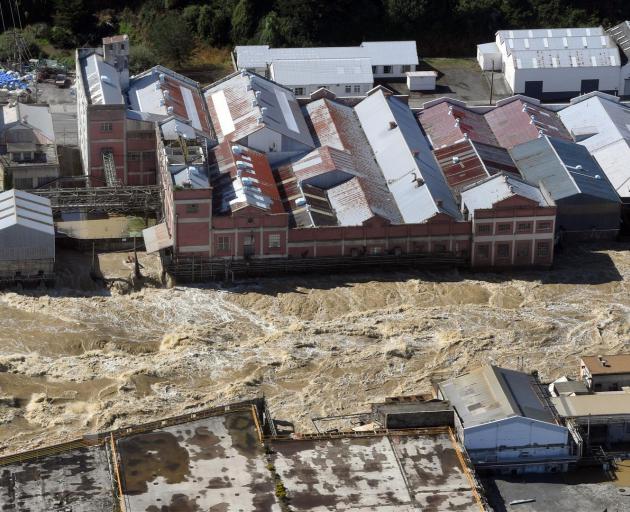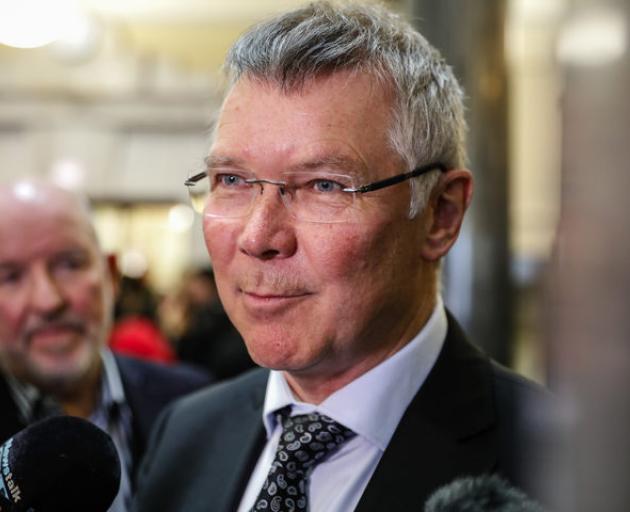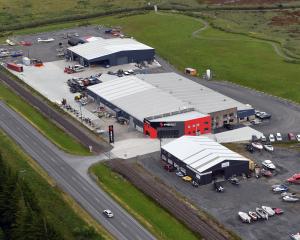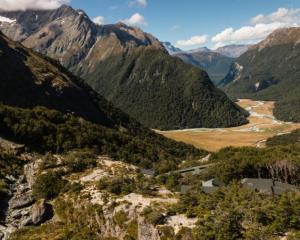
Parker's tough words follow claims the company reneged on a verbal agreement given last week to remove the waste that has been stored in the Southland town of Mataura for the past six years.
The the 10,000 tonnes of ouvea premix in a disused paper mill came close to being inundated by flood waters last week which could have set off a highly dangerous cloud of ammonia gas.
Rio Tinto's website states it is committed to mitigating its operations' impact and has stories about its efforts to help look after the environment, from bears in Canada to native trees in Australia.
Parker said Rio Tinto needed to clean up its "mess" in Southland.
"For them to try and escape some responsibility for cleaning up the mess that comes from their own smelter. It's outrageous. I can't reconcile it with their statements of corporate responsibility that they put on their own website.
"You know, they talk about preserving grizzly bears in Canada and migrating birds in Australia. Well perhaps they could take the same stance when it comes to the people and the environment of Southland."
Rio Tinto thought it had dealt with the problem when it paid Bahrain's Taha Industries to take the dross off its hands in 2014.

Fast forward to last week, and Gore District Council chief executive Steve Parry said it had a verbal agreement with the chief executive of the smelter, Stewart Hamilton, to speed up the removal of the dross, and and store it at the smelter.
But days later, Parry said, the head of the smelter had reneged on that deal.
Parker said that was disgraceful.
"Central government agreed to kick in a million dollars, the smelter a bit more than a million dollars and the councils some hundreds of thousands of dollars to get the clean-up started in a major way.
"You know, we didn't bring to bear those underlying legal liability issues but, you know, maybe we the Government should be looking at suing them now. I've had enough."
Parry said he was told that Rio Tinto did not want to import any extra liability on the site until its strategic review on the future of the Tiwai Point smelter was completed at the end of March.
The contract in place provides for moving the dross from the factory in up to two-and-a-half years. "Given the floods we've just had that was considered to be just too long." The high-level agreement in principle was for a three-month removal period starting at the end of March, Parry said.
Parry said as a small council, Gore would be reluctant to take legal action on its own.
"What we don't want to see is a process bogged down in legal action which could take a long time and cost a lot of money.
"We need to remember there is a contract in place, it is still running, it's performing to expectations and in two, two-and-a-half years that warehouse in Mataura will be cleared out."

"It's got a history of crying wolf over their financial situation to try to wring out concessions from successive New Zealand Governments," he said.
"They're trying to hide behind a contract they had that went wrong. They paid a company to take this dross from this site and in the end that dross was just dumped at various sites around Southland. It wasn't processed. Rio Tinto say it's not their problem that their contractor didn't do it."
The minister said any court action would not take place quickly, and he didn't want to overstate the risk given the highest flood on record did not get into the warehouse. But there was a contrast between Rio Tinto's statements on the environment and its conduct in New Zealand.
Smelter chief executive Stewart Hamilton did not return RNZ's calls asking for comment. He released a statement which did not address whether the company had given a verbal undertaking.
"We remain committed to a solution that removes the material," the statement reads. "NZAS has committed to contributing $1.75 million to the costs of safely removing and processing the material."
Sort Out The Dross action group spokesperson Cherie Chapman said Rio Tinto should take care of its waste instead of palming off the problem on to the people of Southland.
"The community is very angry, very concerned, very bewildered about why this stuff has not been picked up at speed and taken out of the end of the Mataura paper mill."
Chapman said it was important to remember that nobody in Mataura had a say about the dross being stored in the middle of their town.
"It was snuck in to those buildings without any consents whatsoever, and the resource consent was then retrospective. Shortly after the company went into liquidation. The council has no recourse really when a company goes into liquidation, this is why I think Rio Tinto needs to pick up its act."
Chapman was sending out an open invitation to the smelter to attend a public meeting in Mataura tomorrow night to discuss the problem and what should be done about it.
Comments
Rio Tinto is acting exactly like the Anglo Australian mega miner they are.
Profit is everything to them. They will move manufacturing to and from locations as profits grow or shrink from a facility. They will act exactly the same way Cadbury did in Dunedin.
Locals can accept their coin and have good jobs for a period, but the minute it becomes cheaper to make something cheaper elsewhere they will be gone.
Anyone who doesn't understand how multinationals work is just plain naive. Of course their behaviour is despicable sometimes. Get used to it and get over it.
I completely agree with your analysis of RTZ and their actions Keith but lets not let them get away with environmental vandalism and just 'get used to it'. Before large corps. are allowed to operate in our region they should be made to adhere to acceptable environmental standards and governance. Oh, and pay tax on earnings here and not in some offshore haven. See also OMV.
Responsibility goes to the councils too and the individuals who consented. Especially, that no bond was sought for remedial activity and compliance monitoring should the consent not be complied with or the material not appropriately handled. These individuals and Councils should be reprimanded as strongly as Rio Tinto. It was within their governance to ensure Rio Tinto was a good environmental ambassador. They just pocket their salary these beaucrats and walk away. Environment southland is an environmental disaster.
Another Gore District Council needless debacle! I understand Rio TInto paid a company to remove the dross. GDC gave that company non-notified consent to store the dross at the old paper mills site in Mataura. GDC gave permission, albeit with conditions. The company went broke and walked away. The dross at the mill no longer belongs to Rio Tinto who paid to get rid of it.
Why did GDC give consent to store the dross at that site in the first place? The locals rightfully want the stuff gone, and somebody will have to pay. Perhaps GDC needs to look at itself and take some responsibility. Once more ratepayers, regrettably, will be stung for what can only be described as mismanagement.
CRA--Conzinc rio tinto Australia left similar kinds of environmental hazards in a Bougainville river in the south when they took tons of copper out before 1990. In spite of being ousted by the local war, CRA still made a packet and have never recompensed the Bougainville people and land for this damage. Jobs come and go, but such an environmental hazard lingers on. And local authorities and the government need to be more vigilent and interrogate any such 'investor' before allowing them into this country
Multi-national companies are not people and any bears or trees saved elsewhere is the result of a cost vs return exercise. Simply put, someone has calculated that the money spent on PR has a financial return. The profit generating machine wouldn't have done it, if there wasn't a return to be made.
It is time we stopped pretending that any multi-national has a conscience. They don't, and they're designed not to. It is a legal requirement to work in the shareholders best interest, i.e. profit.
If we want Rio Tinto to spend money cleaning up this mess, it needs to look cost effective to them. All the rage in the world from any human to a company is not only naive, but also meaningless, unless it can be seen to impact on today's or future profits.
Yes, sue them. Don't be enraged, don't just talk about it, do it. Not because "it's not fair" but because court costs, and the likelihood they will lose, will prompt a response.
Importantly, we can't have one hand offering tax breaks, another cheaper power, and yet another discounted transmission. We need a unified approach. Every cent should be dependant on adherence to many obligations. All outlined in one, legally binding contract.











